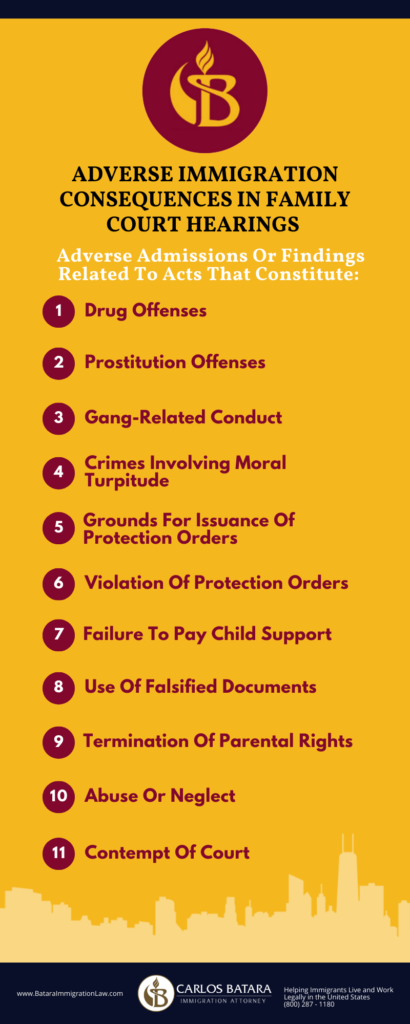
For immigrants, a divorce is not always the worst aspect of divorces. In many instances, a divorce has no impact on immigration status.
On the other hand, navigating the issues of family court proceedings is often like tip-toeing through a field of landmines. One misstep and permanent residency or citizenship dreams are shattered.
Yet, most immigrants in family court are unaware of what is at stake.
In fact, too few family law attorneys grasp how certain actions, safe for U.S. citizens, may undermine the ability of immigrants to remain in the United States.
As a green card attorney, I’ve consulted with countless persons whose immigration status was never inquired about during the divorce lawyer’s repesentation.
But similar to criminal law, the failure to ask “Are you a U.S. citizen?” can and does lead to immigration consequences as severe as those suffered by convicted felons.
What’s The Connection Between Family Law And Immigration Law?
When you’re involved in a divorce, anything you say or write, anything your spouse says or writes, or anything the judge makes a factual finding about, could be utilized by government immigration offiicals in your later immigration hearings.
In particular, conduct-based admissions or findings can cause immigrants to be denied or stripped of immigration benefits, deported from the U.S., and prevented from re-entering the country after travel abroad.
Convictions are not required.
The nastier the divorce, the worse the allegations. And for the immigrant husband or wife, the worse the potential for negative immigration consequences.
So what constitutes “admissions” and “findings”?
- “Admissions” of conduct are statements that are made by an individual under penalty of perjury.
- “Findings” of facts refer to conduct-based conclusions reached by a family court adjudicator.
Usually, both admissions and findings are formally recorded and transcribed as part of the court hearing official records.
Hence, they can be easily discovered by immigration authorities.
Moreover, even if the couple reconcile, the conduct-based client admissions or judicial findings of facts can still impede the immigrant spouse’s path to permanent residence, citizenship, or protection against deportation.
Such an outcome may occur despite the filing of a new green card application sponsored by a different spourse several years later, or even by a child, parent, sibling.
So what admissions or findings carry the most potential for damage to immigrants?

11 Adverse Admissions Or Findings For Immigrants To Avoid In Family Court Cases
The most common admissions or findings of fact that immigrant spouses should avoid in divorce proceedings are related to:
- 1. Drug Offenses
- 2. Prostitution Offenses
- 3. Gang-Related Conduct
- 4. Crimes Involving Moral Turpitude
- 5. Grounds For Issuance Of Protective Orders
- 6. Violation Of Protective Orders
- 7. Failure To Pay Child Support
- 8. Use Of Falsified Documents
- 9. Termination Of Parental Rights
- 10. Abuse Or Neglect
- 11. Contempt Of Court
Angry, quarreling spouses are prone to lodging accusations of drug and alcohol abuse, money earned under the table which was not reported on income taxes, and hanging out with friends who belong to gangs . . .
Any of which can lead to client admissions or orders from the court, all of which can cause major problems at future immigration hearings or interviews.
The use of fake social security cards, drivers’ licenses, and work permits, attendance in drug treatment programs, and the loss, even temporarily, of child visitations and custody privileges will not be viewed favorably by immigration judges or officers.
Multiple entries into and exits from the United States, without permission, are often revealed in signed declarations and statements in open family court.
In many instances, the allegations are unfounded or exaggerated. Nevertheless, to the extent they remain part of family court records, they retain the capability to undermine efforts to win legal residency or citizenship many years afterwards.
It’s more preferable to avoid volatile battles that open up an evil Pandora’s box that leads to lifelong scarlet letters.
How Do Immigration Officials Obtain Access To Family Court Records?
You might be wondering how can immigration authorities find out about admissions and findings of fact in family court cases.
Quite easily.
By requiring individuals applying for immigration benefits or relief from deportation to produce such records.
In other instances, agents often identify adverse information via data-sharing agreements between local, state, and federal goverment agencies, courts, and law enforcment offices.
In my experience defending immigrants on appeals, I’ve found there are three primary ways family court matters are discovered.
First, the most obvious method is through questions posed on applications and petitions for immigration benefits.
For instance, Form I-485, the application filed to seek permanent resident status, seeks answers to the following questions:
- Question 25. Have you ever been arrested, cited, charged, or detained for any reason by any law enforcement official?
- Question 26. Have you ever committed a crime of any kind (even if you were not arrested, cited, charged with, or tried for that crime)?
- Question 28. Have you ever been ordered punished by a judge or had conditions imposed on you that restrained your liberty (such as a prison sentence, suspended sentence, house arrest, parole, alternative sentencing, drug or alcohol treatment, rehabilitative programs or classes, probation, or community service)?
- Question 30. Have you ever violated (or attempted or conspired to violate) any controlled substance law or regulation of a state, the United States, or a foreign country.
Second, questions asked during USCIS interview or immigration court hearings.
An immigrant seeking cancellation of removal will be asked about his relationship with his children. If he does not live with them, the court will inquire why they reside apart. This can lead to a long series of questions regarding issues like child support, protective orders, and drug rehabilitation treatment.
Or if there has been a court-enforced adoption or foster care order, the underlying reasons for such an order will be extensively probed for other collaterall incidents of wrongdoing.
Third, questions asked upon reentry to the United States.
Similar inquiries might occur when an immigrant is inspected at the border upon returning from a short vacation, especially when domestic violence orders of protection, warrants for violation of restraining orders, or arrests pursuant to contempt of court orders appear in the DHS database.
Once such information is discerned, immigration officers are allowed to make requests for additional evidence, and may require immigrants to provide records from their past family law cases.
Neither state confidentiality or record sealing laws prevent federal immigration agents from mandating that such information is turned over to them.
And being under an obligation to answer these types of inquiries under penalty of perjury, refusal to comply places immigrants at risk of being charged with criminal law violations.

Why The Etiquette Of Diplomacy Is The Preferred Immigration Option
Having practiced family law alongside immigration law during the early years of my career, I learned admissions or findings related to the 11 types of acts listed above to be the most adverse in subsequent immigration cases.
Staying as far away from them as possible is mission critical for immigrants.
Unfortunately, many adults turn into immature children when undergoing a divorce. They think first about smearing the other party’s reputation, instead of reaching a solution that protects their children and financial situation as much as mutually possible.
I still recall Judge Logan’s words to the wise at the start of his family law calendar each morning.
“Welcome to the Family Court, the unhappiest place on earth,” the old codger would warn soon-to-be ex-spouses, “where big decisions affecting the rest of your lives will be made.”
He would then add, “I want you to take a few minutes, go outside, and try to reach an agreement on your own. Because if you come back in here without one, I guarantee my order will be worse than any settlement you imagined.”
And yet, many couples came back in empty-handed, often prompted by their attorneys to fight for the maximum. This type of outcome too often spelled disaster for immigrants in their later attempts to win a green card or naturalization.
For immigrants, when it comes to divorce proceedings, taking the high road is preferred.
War-like behavior is almost certain to lead to contaminated evidence before an immigration judge or USCIS officer.
Diplomacy is warranted.
By Carlos Batara, Immigration Law, Policy, And Politics




